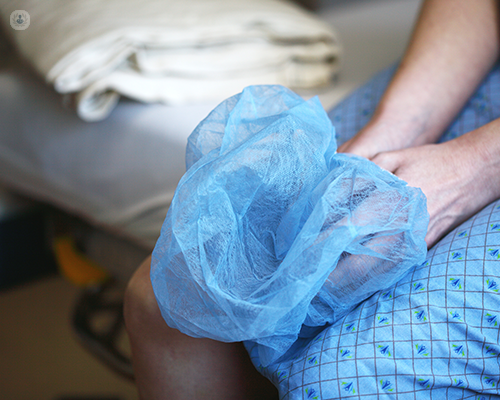Should you have a knee replacement?
Autore:Are you considering a knee replacement? Knee specialists such as Mr Amit Shah can help you make an informed decision with the best possible outcome.
Mr Shah uses his orthopaedic expertise to clarify how surgeons like him decide whether a knee replacement is needed to achieve the best quality of living. He also clarifies what knee replacements are made of, how long recovery takes and how long knee replacements last.

How does an orthopaedic surgeon decide that a knee replacement is needed?
To start with, the need for a knee replacement is based on a combination of:
- Understanding clinical symptoms.
- Matching clinical symptoms with scan results.
Sometimes, clinical symptoms and weight-bearing X-ray scans are enough and other scans, such as an MRI scan, aren’t needed to decide if a knee replacement should be considered. Pain in the knee can be caused by the back and hips, so we want to ensure that the pain really is coming from the knee before considering knee surgery .
The next step is to understand which treatment has already been tried and exhausted. We want to wait until all simpler forms of management have been exhausted. Then, if I feel that all conservative measures have been exhausted, I would talk about the benefits and risks of surgery.
Is there an alternative to knee replacements?
Alternatives to surgery include:
- Joint injections
- Lifestyle modifications
- Musculoskeletal physiotherapy
- A splint or brace
Having said that, whether we should try alternatives first depends on the condition of the knee. For example, if a patient’s knee arthritis is extreme and the conservative measures are not going to work, then it’s difficult to consider alternatives to surgery, which will be the main option.
It also depends on the patient’s expectations and risk. Usually, the procedure of choice is the one that is going to get them mobile again. If a patient doesn’t want surgery, they might manage a brace and joint injection, whereas some patients might prefer a wheelchair over the risk of surgery. Most people prefer to have independence i.e. no walking sticks or wheelchair, and that’s why they choose surgery.
What material is a knee replacement made of?
Knee replacements are made of a combination of different metals and plastics.
- Cobalt
- Chromium
- Titanium
The replacement consists of metal on both sides of the femur and tibia, and the plastic goes in between . Sometimes, the plastic is a fixed piece of plastic and other times, it’s a rotating piece. This is generally the surgeon’s choice more than the patient’s.
How long should a knee replacement last?
Modern knee replacements should last 10-20 years. 90 per cent of replacements will last approximately 15 years and then gradually start to fail. How long a knee replacement lasts depends on the patient, their weight and the way they use it.
How long does it take to recover from knee replacement surgery?
I use lots of enhanced recovery techniques so that patients take barely more than 24-48 hours to begin recovery. Recovery to be able to drive and to walk without crutches can take 4-6 weeks. Most people can go back to activity such as the gym, golfing, swimming and cycling 6-8 weeks after surgery. However, they’ll be advised to ease into it slowly to avoid injury.
Do patients need to adjust any lifestyle habits after knee replacement surgery?
There are no real lifestyle changes. Some patients might find it difficult to kneel after knee replacement surgery, so they might find it difficult to garden on all fours or find it difficult to use ladders.
Knee replacements and the COVID-19 pandemic
The coronavirus pandemic has thrown in some challenges regarding knee surgery, but lots of new measures are being put into place to ensure that safety is maximised. This includes all healthcare members of staff being tested regularly and all patients being tested before their hospital admission. Therefore, the risk of contracting the COVID-19 virus during an elective procedure is very small.
Learn how you can benefit from Mr Shah’s professional and personalised surgical care – visit his profile.


